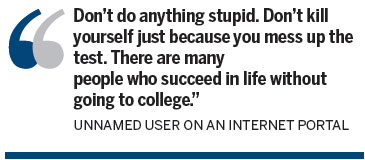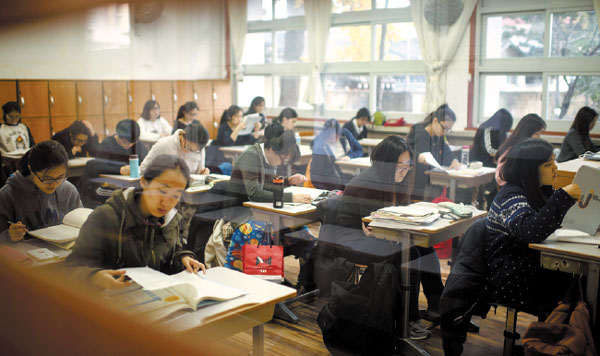South Korea falls silent for high-pressure college exam
Career and even marriage prospects hinge on outcome of entrance test
South Korea went into hush mode on Thursday, as nearly 650,000 students took the annual college entrance exam that will play a large part in defining their adult lives in a highly competitive society.
Preparation for the crucial exams starts from primary school, and so does the relentless pressure that has been blamed for everything from early burnout to teenage depression and suicide.
A 17-year-old boy was found dead on Wednesday after apparently jumping from the window of his family's apartment. His parents told Yonhap News Agency that he had become extremely stressed as the test neared.
Success in the exam means a secure place in one of South Korea's elite universities. It's seen as a key to future careers as well as to marriage prospects.
With so much riding on the outcome, much of the country becomes muted on the day of the test - held simultaneously in 1,257 centers nationwide.
The Transportation Ministry bans all airport landings and departures for a 40-minute period to coincide with the main language listening section of the test.
The military also reschedules air force drills and live-fire exercises, while automobile traffic is barred within a 200-meter radius of testing centers.

Public offices and major businesses, as well as the stock market, opened an hour later than usual on Thursday to help keep the roads relatively clear and ensure students' timely arrival for the exam, which began at 8:40 am.
Anyone who did get stuck could dial the emergency number 112 and request help from police cars and motorbikes on standby to rush them to exam centers.
At Seoul's Pungmoon Girls' High School, junior students huddled together in temperatures as low as - 3 C, held good-luck banners and shouted encouragement as their seniors entered the exam room.
For the equally stressed parents, there was little left to do after a final hug at the school gates.
Many quickly made their way to nearby churches and temples in search of divine intervention.
One exam-taker with no parental backing was 81-year-old Cho Hee-ok who took the test in the hope of entering a fashion college.
Forced to give up her early schooling and take up needlework to help her widowed mother, Cho told Yonhap her dream was to work "making clothes for poor neighbors".
Major Internet portals and social networks were flooded with good-luck messages, and "test-takers" and "jackpot for the test" were among the top-trending topics for Korean Twitter users on Thursday morning.
Some warned against taking the exam too seriously.
"Don't do anything stupid," wrote one user on the Naver portal. "Don't kill yourself just because you mess up the test. There are many people who succeed in life without going to college."
Exam day always renews a perennial debate in South Korea about the country's obsession with education and the pros and cons of the college entrance system.
The bottom line for many is that the examination itself is fair.
Everyone takes the same paper, which relies on multiple choice to prevent subjective marking.
But bitter disputes still occur.
A question in the geography section of the 2013 exam - worth three points out of a total 340 - became the subject of a costly, yearlong legal battle after the officially correct answer was challenged by some students and their parents.
Security is absolute, with exam setters sequestered for more than a month in a secret location, which they are allowed to leave only after the test has been taken.
They are kept in total isolation, denied phone contact with their families and with everything down to their food waste subject to rigorous examination.
|
Students take the College Scholastic Ability Test, or college entrance exam, at the Pungmoon high school in Seoul on Thursday. Ed Jones / Agence France-Presse |
(China Daily 11/14/2014 page10)















